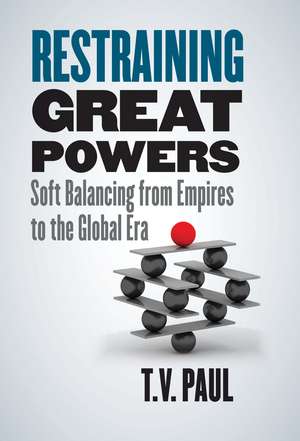Restraining Great Powers: Soft Balancing from Empires to the Global Era
Autor T. V. Paulen Limba Engleză Hardback – 18 sep 2018
At the end of the Cold War, the United States emerged as the world’s most powerful state, and then used that power to initiate wars against smaller countries in the Middle East and South Asia. According to balance-of-power theory—the bedrock of realism in international relations—other states should have joined together militarily to counterbalance the United States’ rising power. Yet they did not. Nor have they united to oppose Chinese aggression in the South China Sea or Russian offensives along its western border.
This does not mean balance-of-power politics is dead, argues renowned international relations scholar T. V. Paul; instead it has taken a different form. Rather than employ familiar strategies such as active military alliances and arms buildups, leading powers have engaged in “soft balancing,” which seeks to restrain threatening powers through the use of international institutions, informal alignments, and economic sanctions. Paul places the evolution of balancing behavior in historical perspective, from the post-Napoleonic era to today’s globalized world. This book offers an illuminating examination of how subtler forms of balance-of-power politics can help states achieve their goals against aggressive powers without wars or arms races.
This does not mean balance-of-power politics is dead, argues renowned international relations scholar T. V. Paul; instead it has taken a different form. Rather than employ familiar strategies such as active military alliances and arms buildups, leading powers have engaged in “soft balancing,” which seeks to restrain threatening powers through the use of international institutions, informal alignments, and economic sanctions. Paul places the evolution of balancing behavior in historical perspective, from the post-Napoleonic era to today’s globalized world. This book offers an illuminating examination of how subtler forms of balance-of-power politics can help states achieve their goals against aggressive powers without wars or arms races.
Preț: 212.79 lei
Nou
Puncte Express: 319
Preț estimativ în valută:
40.72€ • 42.52$ • 33.62£
40.72€ • 42.52$ • 33.62£
Carte disponibilă
Livrare economică 26 martie-09 aprilie
Livrare express 11-15 martie pentru 30.05 lei
Preluare comenzi: 021 569.72.76
Specificații
ISBN-13: 9780300228489
ISBN-10: 0300228481
Pagini: 256
Ilustrații: 4 b-w illus.
Dimensiuni: 156 x 235 x 24 mm
Greutate: 0.52 kg
Editura: Yale University Press
Colecția Yale University Press
ISBN-10: 0300228481
Pagini: 256
Ilustrații: 4 b-w illus.
Dimensiuni: 156 x 235 x 24 mm
Greutate: 0.52 kg
Editura: Yale University Press
Colecția Yale University Press
Recenzii
“Paul argues that the idea of a balance of power is not dead; it has simply taken new, more peaceful forms, which he calls ‘soft balancing.’ . . . U.S. President Donald Trump’s ‘America first’ strategy and China’s growing military power will put his thesis to the test.”—G. John Ikenberry, Foreign Affairs
“Both critics and proponents of the role of the balance of power in international politics treat it as depending on military instruments. The signal accomplishment of T. V. Paul’s book is to show that there is a much larger set of tools that states can employ to restrain troublemakers.”—Robert Jervis, author of How Statesmen Think
"In this sophisticated and sweeping historical survey, T.V. Paul shows how modern states have pursued various types of balancing behavior—short of war—to constrain potential hegemonic powers. Restraining Great Powers is a tour de force that should be carefully read and reflected on by scholars and practitioners alike."—David Shambaugh, George Washington University
“This is a magnificent contribution to our understanding of strategic balancing in its empirical diversity.”— Ashley J. Tellis, Tata Chair for Strategic Affairs, Carnegie Endowment for International Peace
"T.V Paul is on the leading edge of research on the global power shift. This book is a significant advance on our understanding of how great power dynamics can be tamed in the 21st century."— Amitav Acharya, author of Constructing Global Order
“Both critics and proponents of the role of the balance of power in international politics treat it as depending on military instruments. The signal accomplishment of T. V. Paul’s book is to show that there is a much larger set of tools that states can employ to restrain troublemakers.”—Robert Jervis, author of How Statesmen Think
"In this sophisticated and sweeping historical survey, T.V. Paul shows how modern states have pursued various types of balancing behavior—short of war—to constrain potential hegemonic powers. Restraining Great Powers is a tour de force that should be carefully read and reflected on by scholars and practitioners alike."—David Shambaugh, George Washington University
“This is a magnificent contribution to our understanding of strategic balancing in its empirical diversity.”— Ashley J. Tellis, Tata Chair for Strategic Affairs, Carnegie Endowment for International Peace
"T.V Paul is on the leading edge of research on the global power shift. This book is a significant advance on our understanding of how great power dynamics can be tamed in the 21st century."— Amitav Acharya, author of Constructing Global Order
Notă biografică
T. V. Paul is the James McGill Professor of International Relations at McGill University. He has authored or edited eighteen books, including The Warrior State and The Tradition of Non-Use of Nuclear Weapons. He served as president of the International Studies Association (ISA) during 2016–2017.

